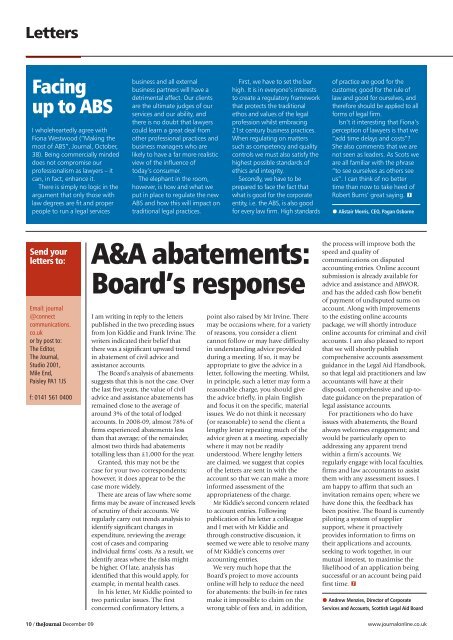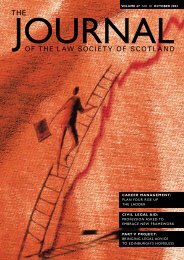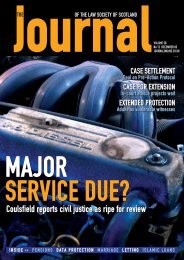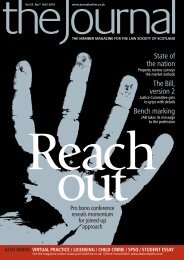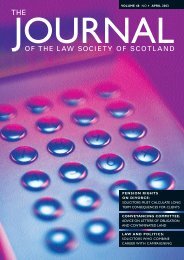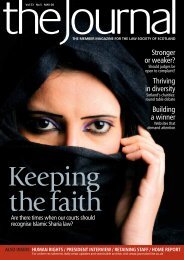Professional briefing - The Journal Online
Professional briefing - The Journal Online
Professional briefing - The Journal Online
Create successful ePaper yourself
Turn your PDF publications into a flip-book with our unique Google optimized e-Paper software.
Letters<br />
Facing<br />
up to ABS<br />
I wholeheartedly agree with<br />
Fiona Westwood (“Making the<br />
most of ABS”, <strong>Journal</strong>, October,<br />
38). Being commercially minded<br />
does not compromise our<br />
professionalism as lawyers – it<br />
can, in fact, enhance it.<br />
<strong>The</strong>re is simply no logic in the<br />
argument that only those with<br />
law degrees are fit and proper<br />
people to run a legal services<br />
Send your<br />
letters to:<br />
Email: journal<br />
@connect<br />
communications.<br />
co.uk<br />
or by post to:<br />
<strong>The</strong> Editor,<br />
<strong>The</strong> <strong>Journal</strong>,<br />
Studio 2001,<br />
Mile End,<br />
Paisley PA1 1JS<br />
f: 0141 561 0400<br />
10 / the<strong>Journal</strong> December 09<br />
business and all external<br />
business partners will have a<br />
detrimental affect. Our clients<br />
are the ultimate judges of our<br />
services and our ability, and<br />
there is no doubt that lawyers<br />
could learn a great deal from<br />
other professional practices and<br />
business managers who are<br />
likely to have a far more realistic<br />
view of the influence of<br />
today’s consumer.<br />
<strong>The</strong> elephant in the room,<br />
however, is how and what we<br />
put in place to regulate the new<br />
ABS and how this will impact on<br />
traditional legal practices.<br />
I am writing in reply to the letters<br />
published in the two preceding issues<br />
from Jon Kiddie and Frank Irvine. <strong>The</strong><br />
writers indicated their belief that<br />
there was a significant upward trend<br />
in abatement of civil advice and<br />
assistance accounts.<br />
<strong>The</strong> Board’s analysis of abatements<br />
suggests that this is not the case. Over<br />
the last five years, the value of civil<br />
advice and assistance abatements has<br />
remained close to the average of<br />
around 3% of the total of lodged<br />
accounts. In 2008-09, almost 78% of<br />
firms experienced abatements less<br />
than that average; of the remainder,<br />
almost two thirds had abatements<br />
totalling less than £1,000 for the year.<br />
Granted, this may not be the<br />
case for your two correspondents;<br />
however, it does appear to be the<br />
case more widely.<br />
<strong>The</strong>re are areas of law where some<br />
firms may be aware of increased levels<br />
of scrutiny of their accounts. We<br />
regularly carry out trends analysis to<br />
identify significant changes in<br />
expenditure, reviewing the average<br />
cost of cases and comparing<br />
individual firms’ costs. As a result, we<br />
identify areas where the risks might<br />
be higher. Of late, analysis has<br />
identified that this would apply, for<br />
example, in mental health cases.<br />
In his letter, Mr Kiddie pointed to<br />
two particular issues. <strong>The</strong> first<br />
concerned confirmatory letters, a<br />
First, we have to set the bar<br />
high. It is in everyone’s interests<br />
to create a regulatory framework<br />
that protects the traditional<br />
ethos and values of the legal<br />
profession whilst embracing<br />
21st century business practices.<br />
When regulating on matters<br />
such as competency and quality<br />
controls we must also satisfy the<br />
highest possible standards of<br />
ethics and integrity.<br />
Secondly, we have to be<br />
prepared to face the fact that<br />
what is good for the corporate<br />
entity, i.e. the ABS, is also good<br />
for every law firm. High standards<br />
A&A abatements:<br />
Board’s response<br />
point also raised by Mr Irvine. <strong>The</strong>re<br />
may be occasions where, for a variety<br />
of reasons, you consider a client<br />
cannot follow or may have difficulty<br />
in understanding advice provided<br />
during a meeting. If so, it may be<br />
appropriate to give the advice in a<br />
letter, following the meeting. Whilst,<br />
in principle, such a letter may form a<br />
reasonable charge, you should give<br />
the advice briefly, in plain English<br />
and focus it on the specific, material<br />
issues. We do not think it necessary<br />
(or reasonable) to send the client a<br />
lengthy letter repeating much of the<br />
advice given at a meeting, especially<br />
where it may not be readily<br />
understood. Where lengthy letters<br />
are claimed, we suggest that copies<br />
of the letters are sent in with the<br />
account so that we can make a more<br />
informed assessment of the<br />
appropriateness of the charge.<br />
Mr Kiddie’s second concern related<br />
to account entries. Following<br />
publication of his letter a colleague<br />
and I met with Mr Kiddie and<br />
through constructive discussion, it<br />
seemed we were able to resolve many<br />
of Mr Kiddie’s concerns over<br />
accounting entries.<br />
We very much hope that the<br />
Board’s project to move accounts<br />
online will help to reduce the need<br />
for abatements: the built-in fee rates<br />
make it impossible to claim on the<br />
wrong table of fees and, in addition,<br />
of practice are good for the<br />
customer, good for the rule of<br />
law and good for ourselves, and<br />
therefore should be applied to all<br />
forms of legal firm.<br />
Isn’t it interesting that Fiona’s<br />
perception of lawyers is that we<br />
“add time delays and costs”?<br />
She also comments that we are<br />
not seen as leaders. As Scots we<br />
are all familiar with the phrase<br />
“to see ourselves as others see<br />
us”. I can think of no better<br />
time than now to take heed of<br />
Robert Burns’ great saying.<br />
Alistair Morris, CEO, Pagan Osborne<br />
the process will improve both the<br />
speed and quality of<br />
communications on disputed<br />
accounting entries. <strong>Online</strong> account<br />
submission is already available for<br />
advice and assistance and ABWOR,<br />
and has the added cash flow benefit<br />
of payment of undisputed sums on<br />
account. Along with improvements<br />
to the existing online accounts<br />
package, we will shortly introduce<br />
online accounts for criminal and civil<br />
accounts. I am also pleased to report<br />
that we will shortly publish<br />
comprehensive accounts assessment<br />
guidance in the Legal Aid Handbook,<br />
so that legal aid practitioners and law<br />
accountants will have at their<br />
disposal, comprehensive and up-todate<br />
guidance on the preparation of<br />
legal assistance accounts.<br />
For practitioners who do have<br />
issues with abatements, the Board<br />
always welcomes engagement; and<br />
would be particularly open to<br />
addressing any apparent trend<br />
within a firm’s accounts. We<br />
regularly engage with local faculties,<br />
firms and law accountants to assist<br />
them with any assessment issues. I<br />
am happy to affirm that such an<br />
invitation remains open; where we<br />
have done this, the feedback has<br />
been positive. <strong>The</strong> Board is currently<br />
piloting a system of supplier<br />
support, where it proactively<br />
provides information to firms on<br />
their applications and accounts,<br />
seeking to work together, in our<br />
mutual interest, to maximise the<br />
likelihood of an application being<br />
successful or an account being paid<br />
first time.<br />
Andrew Menzies, Director of Corporate<br />
Services and Accounts, Scottish Legal Aid Board<br />
www.journalonline.co.uk


